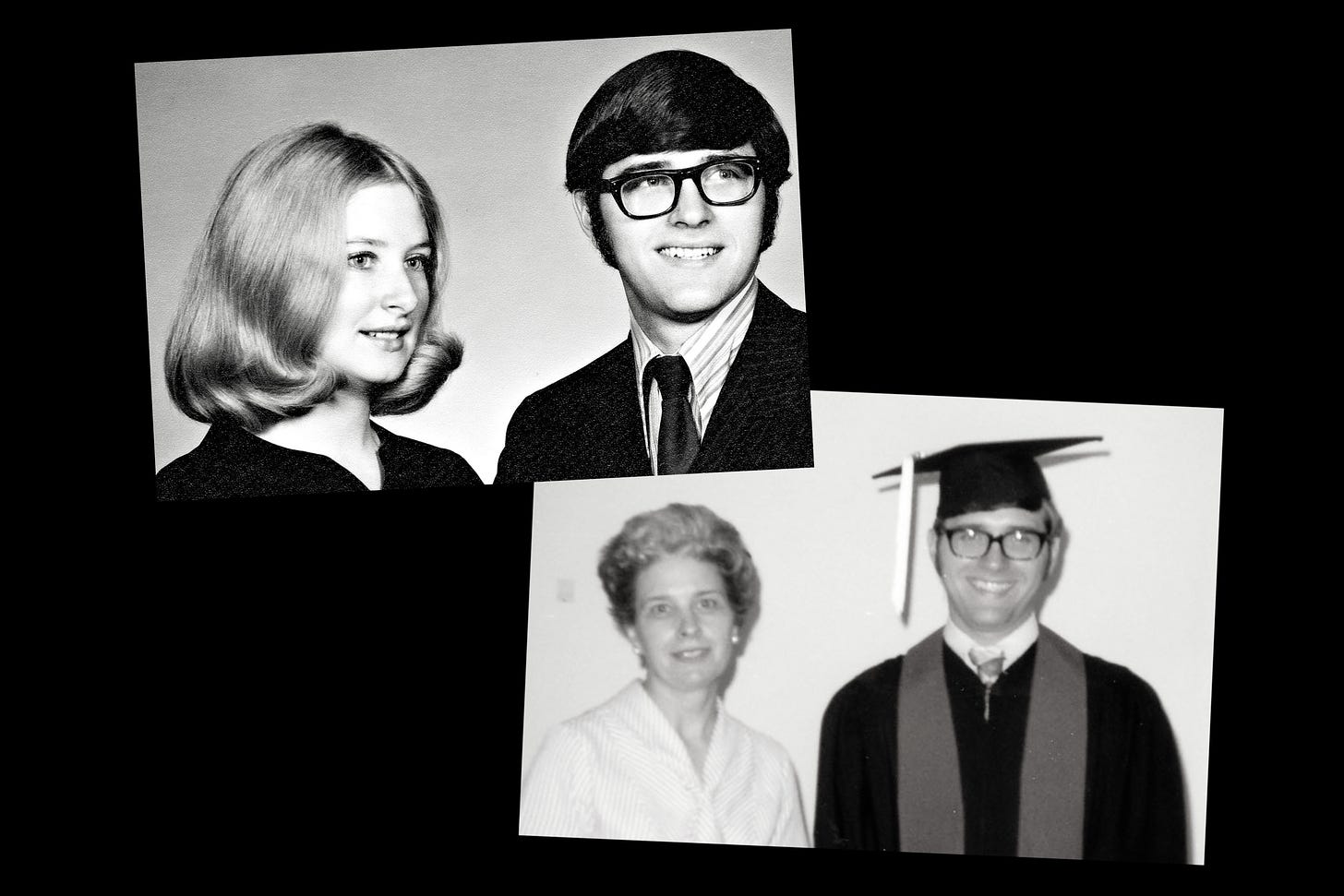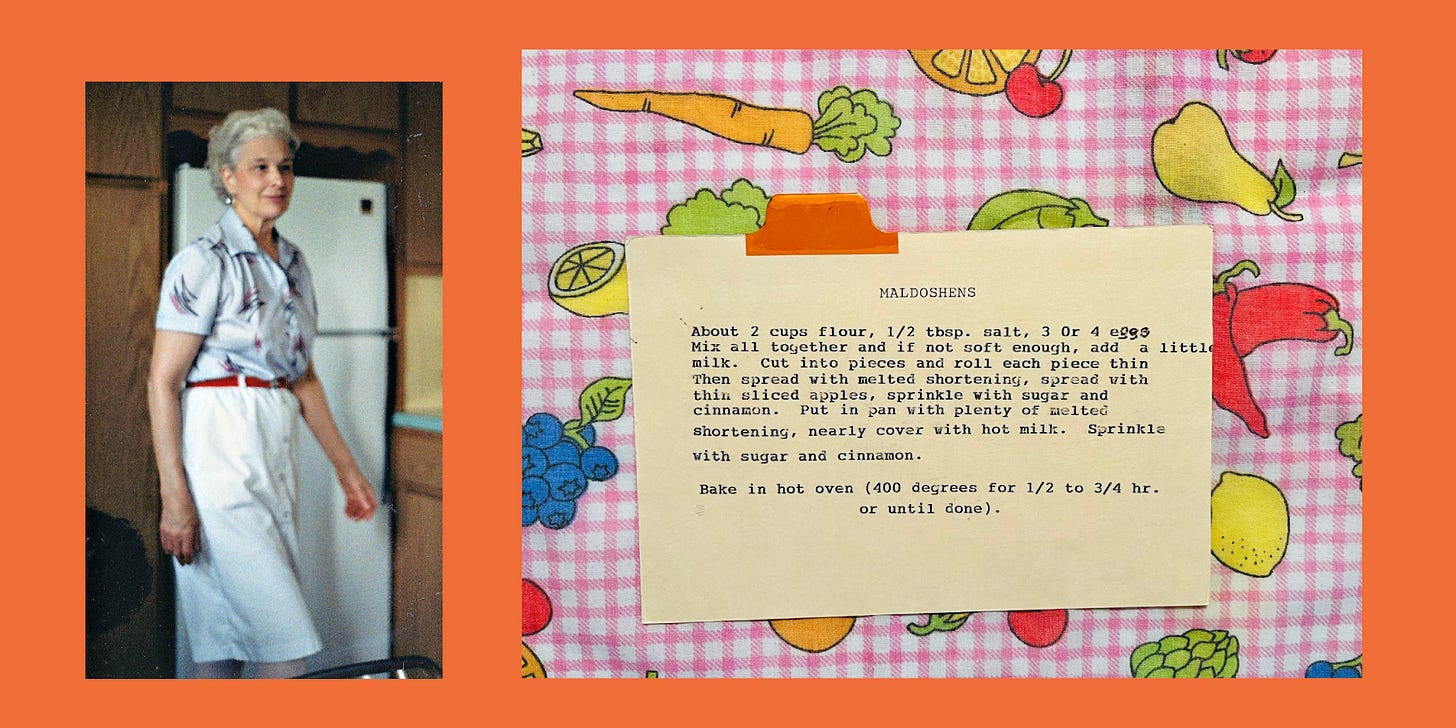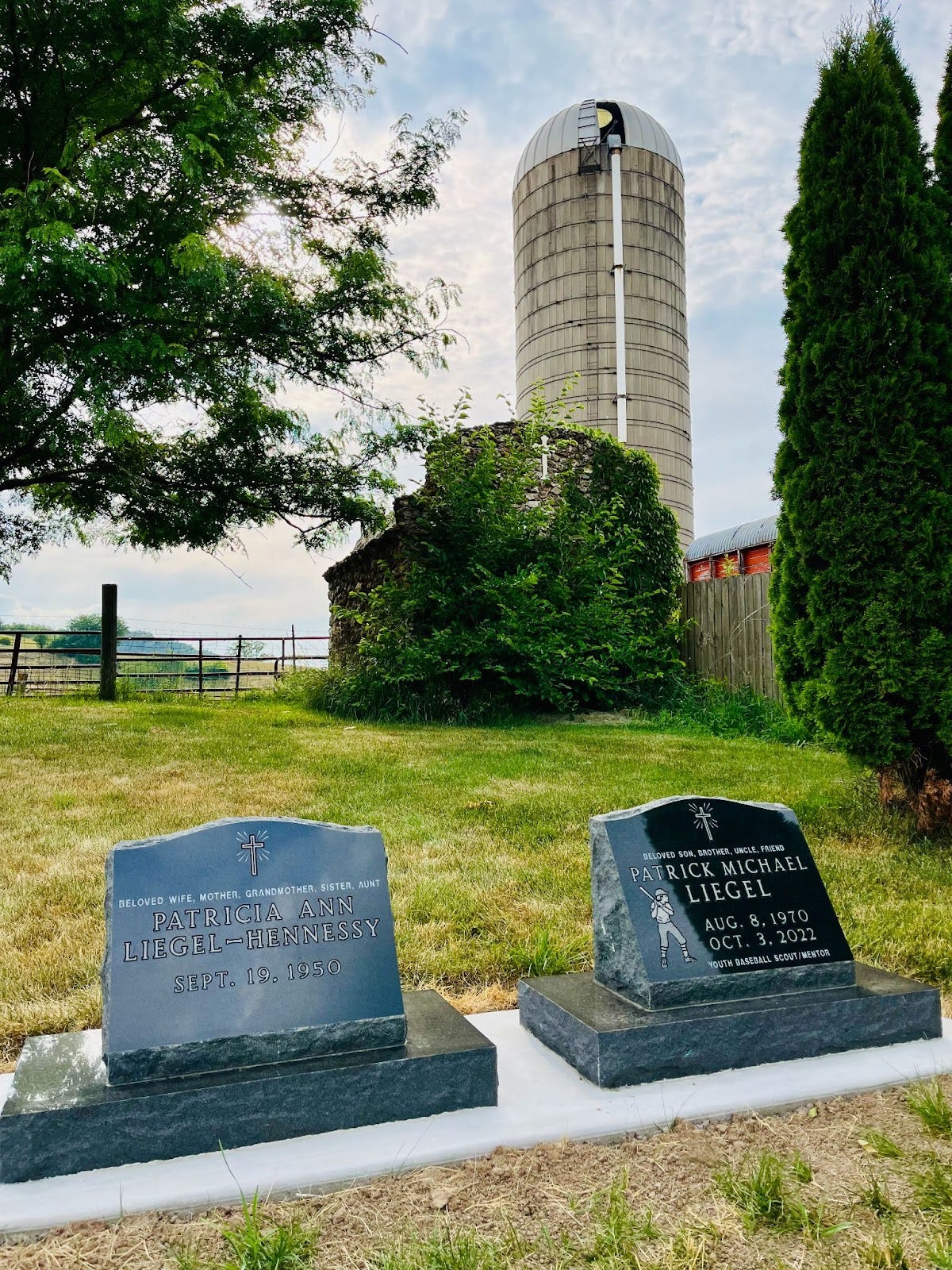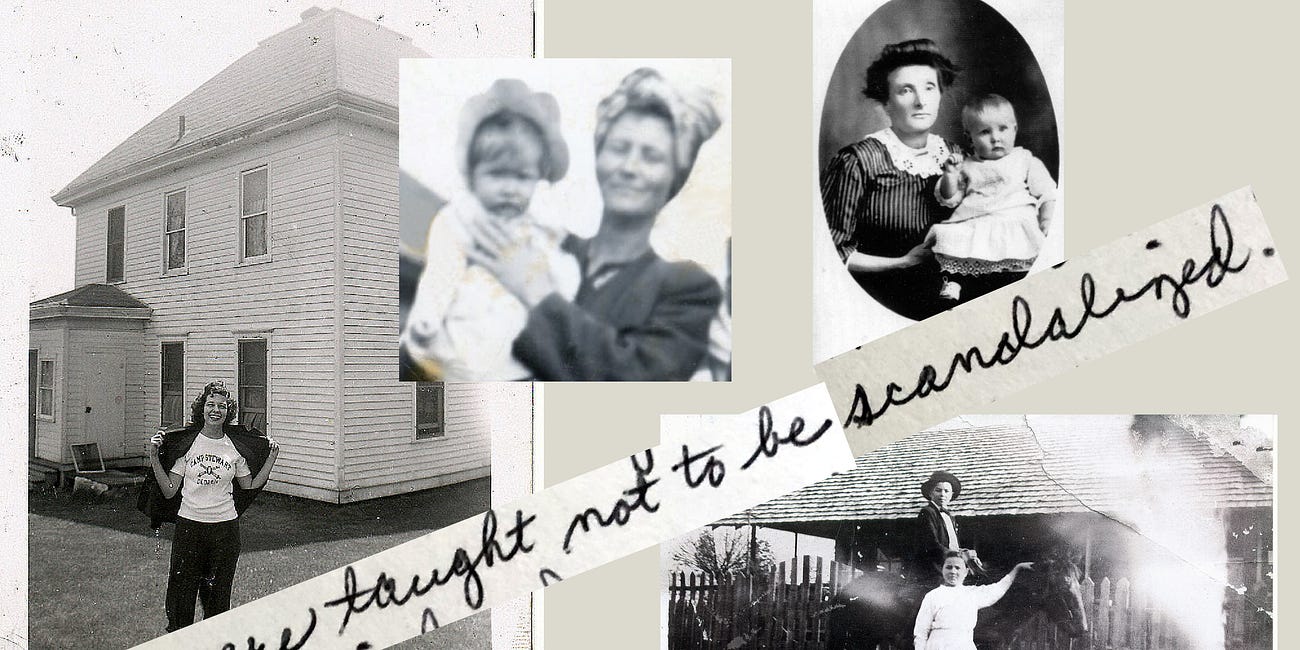The strangeness of being in the middle of your mom and her mother-in-law
My grandma Marie banished my mom from existence after my parents divorced. But I remember when they were both on the same side: my dad's side.
Mother-in-law and daughter-in-law relationships are complicated, even more so after divorce. I was stuck in the middle — between my mom and dad’s mom — for decades. I felt fragmented and wondered: Why are the women who stay sometimes the first to judge? Why do they set the standards other women are compared to?
The more time that passes, the stranger everything from the past looks and the more curious I become. I feel drawn to sitting with those memories. And when I move on, I usually feel like I’m carrying a lighter load even though they’re still there. And they’re still a part of me.
This story is about my grandma Marie. It can be read alone, but it’s an offshoot from “Marriage and Scandal in the Pre-Boomer Olden Days.”
As a kid, my grandma Marie both fascinated and scared me. I knew my grandma had a harsh side, but nothing prepared me for the way my grandma treated my mom after my parents divorced. And I couldn’t understand why.
My grandma couldn’t be around her son for more than a few days without a huge argument blowing up. And she knew my dad didn’t treat mom well. So why did she blame my mom when she finally filed for divorce?
The women on my mom’s side were leavers going back generations, each paying a huge price. I heard the stories.
No matter how Catholicized I was. No matter how ingrained lock-me-up marriage was celebrated. What stuck with me is this: The price of staying in a bad marriage is too high.
At nine, I watched my mom finally take off her wedding ring and place it in a Valium prescription vial she no longer needed, and never really helped.
My mom was labeled a whore and blamed for scandalizing my dad’s family. She was “forbidden” from stepping foot in their hometown as if they somehow owned it. The leaver-vs-stayer divide eclipsed the undercurrent mommy wars by far. But I remember when my mom and grandma were both stayers. Both on the same side: my dad’s side.
A 3-hour drive three decades back in time
We took frequent weekend trips and spent stretches in the summer visiting my grandparents in Plain — a tiny Bavarian Catholic town in Wisconsin's driftless area. The surrounding hills — and treacherous roads in the winter — seemed to draw the insular community in even closer.
I always dreaded the three-hour car ride from Chicago, especially the last hilly hour. Sitting in the privileged place in front between my parents sometimes kept me from throwing up, but still, by the time we pulled up to my grandma’s turn-of-the-century Craftsman, I always felt sick.
Before we exited our red 70s Vista Cruiser station wagon — later traded up for a maroon Chrysler New Yorker — I’d see my grandma Marie standing on the porch, waving anxiously, like she'd been waiting for this moment for weeks, because most likely she had.
She had the beautiful old lady look perfected. She wore colorful button-up dresses — sometimes with floral or fruity patterns — falling just below the knee. Her white head of permed hair never covered the Avon sheen on her face, with lips sometimes matching the reds or pinks in her dress.
And though she might’ve seem dressed up, her dishpan hands, sensible shoes, and apron pulled around her trim waist always displayed a housework ethic that my grandma wore like a badge of honor.
“Well for heaven's sakes alive. I can’t get over how you’ve grown,” she’d tell me as she gave me the biggest hug. My three brothers and I were elevated from being regular rugrat kids to miraculous gifts from God the moment we entered her house. Well, it wasn’t just her house — grandpa lived there, too.
My grandma’s Lysol-ized castle
I felt like royalty during the first few hours of being there. Coming from a 2-bedroom tract townhome, my dad’s childhood home felt like a castle. The high plaster ceilings, formal foyer, thick walnut trim, built-in display cabinets, beveled mirrors, and curved pillars were a lot to take in. Not to mention the 1800-square-foot space, which was almost double the size of my home.
The decor was minimal. Precisely placed aesthetics balanced out the predominantly controlled order. Any garbage or clutter was hidden away. Anything visible was meant to be seen in its precisely placed position.
One of the first places I ran to was the bathroom just off the kitchen. Not to pee, but because I wanted to look out the window. Not at the loud, annoying Kraemer Brothers construction site that rattled the windows. But to the west. Past the hilly fields, towards the barn and silo silhouette.
Common scenery in Wisconsin, but that one was different. That one made me feel something I’d never felt before, and then felt again and again with each visit. Every sensory system in my body felt activated simultaneously when I looked out that window, in that direction. And in those moments, I knew: Some mysterious part of me is attached to that place in a way I’ll never understand.
But after being at my grandma’s house for a few hours, my car sickness turned to homesickness. Something felt wrong, stifling wrong. And I wanted to go back home where I could breathe.
Was it the Lysol-ized smell that bothered me so much? The one that came from the amber bottle my grandma kept in the cellar. I watched her pour the liquefied Lysol over each batch of clothing she washed by hand using her wringer laundry tub. She also used the syrupy stuff to clean floors, sinks, and baseboards.

There was no breathing space in Plain.
I missed home. And I loved my home.
People came from all over the world to live there.
In Plain, everyone was leaving.
Culture shock, plain and simple
Staying in Plain was pure culture shock. I dreaded the weeks during the summer my brothers and I stayed there. Once I locked myself in the bathroom with my mom’s purse, thinking that’d make her stay. The spanking I felt just after the lock was picked was nothing compared to the sting of being left there, a place so different from home, being cared for by a woman so different from my mom.
There was no breathing space outside of the regimented daily life in Plain. I missed the freedoms I had at home.
I remember the clarity I felt when I first learned about the word lenient. “That’s my mom!” I thought. I could explain to my friends why I could do, go, eat, wear, or watch on TV whatever I wanted — all in one word.
But the hardest part about staying with my grandma was eating. And not because I didn’t like my grandma’s food.
Breakfast at eight was often Coco Wheats or homemade coffee cake. She always set out cartons of milk and Five Alive on the cheery vinyl-cloth covered Formica table. Noon suppers included ring bologna, pot roasts, potatoes every way, fresh green beans, just-made white bread, and for dessert apple maldonshens. And dinner at six was a smorgasbord of various leftovers.
Eat your beets, damn it
I even loved the beets my grandma canned from her garden, though I can’t think of them quite the same since I learned how my dad learned to “love” his beets as a kid — having the ones left behind shoved up his nose. Membership to the clean-plate club wasn’t optional.
No matter how hungry I was — or how much I liked the food — my stomach couldn’t relax enough during meals to eat much. A heaviness in mood lingered during meals.
I looked up with reverence at The Last Supper print hanging high on the wall, understanding the heaviness of the moment there. But this one made no sense. The tension between my grandparents was distressing.
During meals my grandma talked about my grandpa in the third person. He’d tap his glass on the table when he wanted more. Even though that might’ve seemed rude, I also understood fewer words between the two was better. Anything could set off an argument — and not the laugh-track, Archie-and-Edith kind.
One rare occasion my grandma left us alone while she took something to a neighbor’s across town — which meant a five-minute walk for my grandma each way. So I’d have ten minutes to find food. I was starving. I ran into her kitchen, looking for calories of almost any kind, but searching first for the maple fudge she’d set out sometimes for dessert.
I couldn’t understand why there was always food at the table, but I couldn’t find anything to quickly grab and eat. Everything was bagged — multiple times — and then rubber-banded. And the bags were old bread bags, so I couldn't even tell what was inside.
Fenced-in by femininity
My brothers did “boy-stuff” with grandpa outside of the house, but I had no FOMO. I had no desire to join in fishing alongside cow pastures, listening to Brewers games on his transistor radio, or watching grandpa do stuff in the town’s sewer plant.
But I would’ve liked to be able to walk to the one-room library. Or to the pool built in the 50s. It was nothing like the new Rand pool waterpark back at home, but still it was a pool.
My grandma wouldn’t even let me walk around the block alone. The fenced backyard was the only place I could roam, with her overlooking from the kitchen window. But I understood why my grandma was so protective.
I saw the little girl shoes preserved in bronze, protected by a statue of Mother Mary. I heard my dad talk about his Irish twin sister he barely remembered but missed. The loss of my grandma’s first child in a hit-and-run accident explained everything. Every time I saw those shoes I wanted to be as nice to my grandma as I possibly could, while knowing nothing could fill the void.
I followed my grandma around, watching her do chores — on scheduled days at scheduled times, always by choice. She explained in step-by-step detail. I listened attentively, occasionally asking questions. And I learned that taking care of things was how my grandma showed love for people. Baking bread, peeling potatoes, jarring jelly, scrubbing until sparkly. All acts of love.
My grandma was teaching me how to be a woman. But it wasn’t what I imagined doing. And it wasn’t where I imagined being.
I didn't wanna be stuck in a mono-hierarchical town with one family name at the top. And I didn’t wanna live in a place that seemed to require simple known narratives about everyone, ones written by a select few. I heard the ones about my mom. I felt the weight of other people’s eyes at Mass, wondering who I’m going to take after. But I knew who I wanted to take after.
I wanted to be like my mom and disappear into an office world with my face Mary Kayed, hair hot-rollered flowing along with my chiffon dress. But it’d be even better for me. I’d have the chance to go to college and make enough money so I’d never have to ask my husband if I could borrow his car.
I wouldn’t even have to get married if I didn’t find someone I wanted to be with. One clear message from reading my childhood diaries was summed up in this line I wrote at 13: “I’d rather be alone than with some controlling man.”
The leaver-vs-stayer divide eclipsed the undercurrent mommy wars by far.
My expectations of what my future 21st century life would be like were shaped by 80s TV. And by mid-June I was usually hooked on ABC’s soaps — the whole three and a half hours. But TV was off-limits in Plain. Withdrawal set in pretty quickly.
There was one TV in my grandma’s house way down in the scary cellar which never failed to summon my Amityville Horror fears. I snuck down once. Before I could find a channel that wasn’t fuzzy, my grandma’s rabbit ears heard me.
Eventually my grandma compromised and let us watch reruns of The Mary Tyler Moore Show if she watched them with us. But then a dating episode came on. I was baffled why she got all worked up about that.
My mom let me stay up late to watch The Thorn Birds miniseries with her when I was eight. My other grandma loved having me sit by her while she watched As the World Turns, smoking Virginia Slims and reveling in the gossipy goodness.
I missed the warmth and casualness of my mom and grandma Odessa, but I had to hold my feelings in. I loved my grandma Marie, knew she loved me, and never wanted to hurt her feelings. Plus, I knew that any little sass coming out of my mouth would get stifled with a bar of Ivory soap. I never wanted to find out the full range of what “or else” might mean.
Nothing prepared me for the way my mom was treated after my parents divorced. My mom was blamed for scandalizing my dad’s family. And I never understood why.
A full-circle ending
For years, my grandma held a grudge against my mom. It seemed unfitting at the time the grudge took hold, and even more senseless that it stuck so long. Even after my dad died, the grudge lived on.
The tone in my grandma’s voice saying “your mother” always struck a nerve, like the visceral reaction that comes when those same two words are used in a pejorative way.
My mom became a faceless woman, like the Polaroid my grandma kept of my mom for all those years. Someone who gave her grandchildren, who cooked and cleaned. For that, she still held some significance for my grandma, but not enough to be a whole person worthy of filling up space.
Several years before my grandma died, the grudge finally ended. Was she too old and tired to continue carrying it? Or did she become more forgiving and accepting in her later years? Maybe to both. Eventually, it seems, everything in life comes full-circle. Yeah, I’ve heard that many times, but now I’m seeing it happen.
My brother’s ashes were buried in Plain late last year. Patrick had no spouse or children and mom decided she would like to be buried next to him — a few steps away from my grandma Marie’s resting place. This past summer we visited the cemetery to see the headstones set in place. I shared this on Instagram:
Mass at St Luke’s in Plain with my lovely mom and enchanting Aunt Peg (my dad’s sister). Afterwards, we went to the cemetery. Mom was so pleased to see Patrick’s headstone in place, and hers too. She put a lot of thought into the design and details.
It’s comforting for my mom to know that her final resting place will be next to Patrick. And it’s pretty ironic too: For decades after my parents divorced my mom was “forbidden” from stepping foot in the town. My aunt pointed out that seeing everything come full circle is healing. And I couldn’t agree more.
I felt a feeling of peace that day, but as the weeks went on, the full glass started feeling half-empty again. Something’s there. Something I need to understand so I can make peace with it because it’s not going away. In my next post I’ll explore the misogynistic underpinnings of the grudge my grandma held for so long.
What’s Next?
My next interview is with
and I’m SO excited! We’ll talk about neurodiversity, the changing work culture, and what leadership means for writers. Plus, I’ll ask her about a few of her essays and the book she’s getting close to finishing: THE SHREWDNESS.Check out
where Amy shares a preview!Related reading:














This was so captivating. I can't wait to read the next chapter. Your grandma Marie sounds interesting.